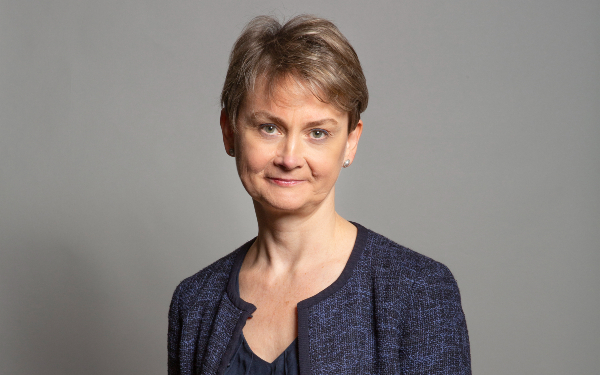
The government will end the recruitment of care workers from abroad later this year, home secretary Yvette Cooper announced today.
Cooper told the BBC’s Laura Kuenssberg that social care providers would no longer be able to recruit staff from abroad via health and care visas when the policy came into force.
Instead, they would need to draw on the domestic labour force, people on other immigration visas or the pool of overseas staff who had been left without a job after losing visa sponsorship.
The policy was confirmed in the government’s immigration white paper, published on Monday (12 May), which said the measure would reduce immigration by 7,000 a year.
The news has sparked alarm from social care bodies, who said international recruitment had been a “lifeline” for the sector in recent years and that the decision risked “extreme workforce shortages” and harm to disabled and older people.
Positive impact of sharp rise in overseas recruitment
In 2021, the then government relaxed immigration rules to allow providers to recruit senior care workers on the health and care visa, on the basis that they were a shortage occupation, extending this to all care workers the following year.
This enabled a sharp rise in international recruitment into social care from 2022-24 that drove a reduction in vacancy levels, from a record high of 164,000, in 2022, to 131,000 in 2024, and reduced turnover rates to their lowest level in a decade.
International recruits were also significantly less likely to take days off sick and more likely to have met the care certificate standards, which state basic expectations of care workers, than British staff, according to Skills for Care research.
Drop in number of new international staff
However, since 2024, the level of overseas recruitment has plummeted on the back of immigration restrictions introduced by the Conservatives, under which staff were prevented from bringing in family members with them when taking up jobs in the UK.
According to Skills for Care figures, about 11,000 people from overseas took up posts in English independent care providers in each quarter of 2024-25, down from 26,000 per quarter the previous year. This includes staff on health and care visas and who have come through other immigration routes.
The Labour government tightened the system further last month, by preventing English providers from recruiting from abroad unless they had first tried to fill roles with overseas staff left without work because their employers had had their visa sponsorship licences revoked.
It also raised the minimum salary required for an overseas recruit to £25,000, or £12.82 an hour, above the national living wage (£12.21) that many care staff are paid.
But in its immigration white paper, the government has gone further by pledging to end overseas recruitment of care staff, as part of reforms to reserve skilled worker visas for graduate-level jobs in most cases.
For all other roles, recruitment from abroad would be “strictly time-limited”, granted only on the basis of strong evidence of shortages in critical roles and where employers were committed to increasing their numbers of domestic staff.
End to international recruitment into care sector
In her appearance on Sunday with Laura Kuenssberg, Cooper said: “We’re going to change those rules this year to prevent the care worker visa from being used to recruit from abroad,” the home secretary said.
She said that instead, employers would have to rely on staff from the following groups:
- The domestic labour force;
- Existing staff on health and care visas, whose visas will continue to be extendable;
- People from abroad who are in the UK on other immigration routes, such as student, graduate or family visas, who would be able to apply to switch to a health and care visa
- The pool of workers brought left without a job because their employer’s sponsorship had been cancelled, including in cases of exploitation.
However, visa extensions and in-country switching of visas will only be permitted until 2028, though this would be kept under review, said the white paper.
Requirement to recruit from pool of displaced staff
In relation to the pool of displaced staff, Cooper told Kuennsberg: “There’s more than 10,000 people who came on a care visa where the sponsorship visa was cancelled, effectively they came to jobs that weren’t effectively here or were not of the proper standard.
“They are here and care companies should be recruiting from that pool of people, rather than recruiting from abroad. So we are closing recruitment from abroad.”
She said that this policy would be introduced alongside the planned fair pay agreement for adult social care. Under this, an Adult Social Care Negotiating Body would be set up to set pay and conditions for the sector, with the intent being that this will drive up salaries and make the sector more attractive for people from the UK.
Vacancies ‘largely driven by historic levels of poor pay’
In the white paper, the government said vacancies in social care were “largely driven by historic levels of poor pay and poor terms and conditions leading to low domestic recruitment and retention rates”.
It said it was committed to tackling these issues through the fair pay agreement, which would “empower worker, employer and other sector representatives to negotiate improvements in the terms
of employment” and “move the UK away from a dependence on overseas workers to fulfil our care needs”.
Warning of ‘extreme workforce shortages’
However, provider leaders warned that the fair pay agreement was years away from implementation and the government had not allocated any funding to implementing it.
In the meantime, withdrawing the option of overseas recruitment risked “extreme workforce shortages” and harm to people needing care and support, said the Homecare Association.
Its chief executive, Jane Townson, added: “International recruitment is a lifeline for the home care sector, enabling us to provide vital support to older and disabled people in their own homes. Care providers are already struggling to recruit within the UK.
“We are deeply concerned the government has not properly considered what will happen to the millions of people who depend on care at home to live safely and independently.”
‘A crushing blow to an already fragile sector’
For fellow provider representative body Care England, chief executive Martin Green described the decision as “a crushing blow to an already fragile sector”.
Among other longstanding pressures, services are dealing with the impact of last month’s rise in employer national insurance contributions.
This will cost English independent adult social care providers an extra £2.8bn in 2025-26, according to think-tank the Nuffield Trust, with sector bodies warning that councils are not fully covering the increased costs for services they commission.
“For years, the sector has been propping itself up with dwindling resources, rising costs and mounting vacancies,” Green added.
“International recruitment wasn’t a silver bullet, but it was a lifeline. Taking it away now, with no warning, no funding, and no alternative, is not just short-sighted – it’s cruel.”
Sector faces ‘triple whammy’
The Association of Directors of Adult Social Services (ADASS) said that “cutting off this source of new workers without a plan about how to replace them domestically will worry many older and disabled people, their families and employers”.
President Jess McGregor added: “A shortage of care workers leads to a triple whammy of more reliance on agency staff who the person drawing on care won’t know and who the provider will need to pay much more for, more people – especially women – giving up paid work to care for their loved ones, and many people potentially missing out on care altogether.”
She urged the government to “commit to a workforce strategy which provides proper pay, career progression and training, comparable with the NHS”.
What workforce strategy said about immigration
Skills for Care produced a sector-led, 15-year workforce strategy for adult social care last year, which called for significant increases in pay and investment in training, to help the sector meet a projected need for 540,000 more staff by 2040, due to population ageing.
This proposed a transition plan to reduce reliance on overseas staff by supporting better domestic recruitment and retention.
However, it stressed that while such a plan was developed and implemented, “immigration policy should be mindful of the sector’s current need to recruit internationally”.
McGregor also called on ministers to “outline how the fair pay agreement for care workers will be funded and timescales for implementation”.
‘Social care would have collapsed long ago without overseas staff’
UNISON general secretary Christina McAnea said the NHS and social care “would have collapsed long ago without the thousands of workers who’ve come to the UK from overseas”.
Pointing to the sharp drop in the number of visas issued in the past year, she said care workers no longer wanted to come to the UK because of “hostile language towards migrants, the ban on bringing dependants and exploitation by unscrupulous employers”.
“The government must get on with making its fair pay agreement a reality and ensure social care is funded properly,” she added.
“So long as care wages stay barely above the legal minimum, employers will never be able to recruit the staff needed to deliver a national care service of which we can all be proud.”
Policy is ‘hugely risky’, warns think-tank
In its response, the Nuffield Trust said that “closing off international recruitment” without properly addressing the UK’s “poor” domestic supply of care workers was “hugely risky”, as care providers could not boost domestic recruitment “overnight”.
“While plans for a fair pay agreement for care workers show ambitions to make the sector a more attractive workplace for UK citizens, these reforms won’t kick in for years, so there is going to be a void where social care employers will struggle even more to fill vacancies,” said deputy director of policy Natasha Curry.





 Bournemouth, Christchurch and Poole
Bournemouth, Christchurch and Poole  Hampshire County Council
Hampshire County Council  Oxfordshire County Council
Oxfordshire County Council  South Gloucestershire Council
South Gloucestershire Council  Wokingham Borough Council
Wokingham Borough Council  Harnessing social work values to shape your career pathway
Harnessing social work values to shape your career pathway  Webinar: building a practice framework with the influence of practitioner voice
Webinar: building a practice framework with the influence of practitioner voice  ‘They don’t have to retell their story’: building long-lasting relationships with children and young people
‘They don’t have to retell their story’: building long-lasting relationships with children and young people  Podcast: returning to social work after becoming a first-time parent
Podcast: returning to social work after becoming a first-time parent  Workforce Insights – showcasing a selection of the sector’s top recruiters
Workforce Insights – showcasing a selection of the sector’s top recruiters  Free CPD on Parkinson’s for health and social care staff
Free CPD on Parkinson’s for health and social care staff 

 Facebook
Facebook X
X LinkedIn
LinkedIn Instagram
Instagram
Please will those who applied before the policy be considered when there is the need?
This is a poor policy. People in this country will not do the work, pay low, hours unsocial, they are better off on benefits. Add to it the drive to earn so many £s before can work here, will exclude many overseas care workers, many live in HMOs as only rent they can afford.
Basically, overseas care workers are being the scapegoat for those arriving on the boats who are not working, and a failed benefit system where it is financially not worth doing low paid work
Spot on!
Increase the pay, value, status and training for this job and you will be inundated with applications from Brits.
Right now we have poor pay, limited training, pressure for rushed visits.